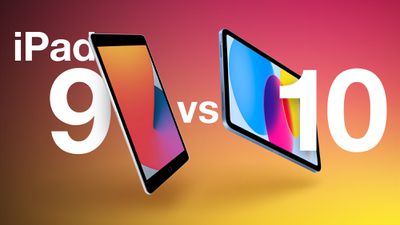The 10th-generation iPad is now available for a starting price of $449, but its predecessor, the ninth-generation iPad, remains available from Apple for the same $329 starting price.

The 64GB and 256GB ninth-generation iPad models continue to be available for $329 and $479, respectively. They are still offered in the same Silver and Space Gray color options, meaning that there has been no change to the pricing or available configurations of the device.
The entry-level iPad is an important device in Apple's lineup, particularly for the education market, because it provides an accessible on-ramp to basic computing on the iPad at a low price point. Despite being successive generations of the same device, there are substantial differences between the ninth- and 10th-generation iPad that justify their $120 difference in price, which may make it difficult to choose which device is best for you.
So should you consider buying the ninth-generation iPad to save money, or do you need the 10th-generation iPad instead? This breakdown serves as a clear way to see all the similarities and differences between the two devices.
- Touch ID
- Retina display (264 ppi) with True Tone and 500 nits max brightness (typical)
- Apple silicon chip with 6-core CPU (2 performance cores and 4 efficiency cores) and 4-core GPU
- Digital zoom up to 5x, 3x video zoom, slo-mo video support for 720p at 120 fps, and time-lapse video with stabilization
- 12MP Ultra Wide front-facing camera (ƒ/2.4 aperture) with 2x zoom out, Center Stage, Retina Flash, Extended dynamic range for video up to 30 fps, Cinematic video stabilization, and 1080p HD video recording up to 60 fps
- Two speaker audio
- Up to 10-hour battery life
- 64GB and 256GB storage options
- First-generation Apple Pencil support
Differences
9th-Generation iPad (2021)
- "Old" iPad design (like first-generation iPad Air, 2013)
- 7.5mm thickness
- Weight of 487/498 grams
- Space Gray and Silver color options
- Touch ID home button
- 10.5-inch Retina display (2160-by-1620)
- A13 Bionic chip (2019)
- 8-core Neural Engine
- 3GB RAM
- 8MP Wide rear camera (ƒ/2.4 aperture)
- HDR for photos
- 1080p HD video recording at up to 30 fps
- 12MP portrait Ultra Wide front-facing camera
- Two-speaker audio
- Lightning port
- Bluetooth 4.2
- Wi‑Fi (802.11a/b/g/n/ac); 2.4GHz and 5GHz; speeds up to 866 Mbps
- 4G LTE connectivity (cellular models)
- Smart Keyboard support
- Starts at $329
10th-Generation iPad (2022)
- "New" iPad design with flat sides (like iPad Pro, 2018)
- 7mm thickness
- Weight of 477/481 grams
- Silver, Pink, Blue, and Yellow color options
- Touch ID top button
- 10.9-inch Liquid Retina display (2360‑by‑1640)
- A14 Bionic chip (2020)
- 16-core Neural Engine
- 4GB RAM
- 12MP Wide rear camera (ƒ/1.8 aperture)
- Smart HDR 3 for photos
- 4K video recording at up to 60 fps
- Extended dynamic range for video up to 30 fps
- 12MP landscape Ultra Wide front-facing camera
- Landscape two-speaker audio
- USB-C port
- Bluetooth 5.2
- Wi‑Fi 6 (802.11ax); 2.4GHz and 5GHz; speeds up to 1.2 Gbps
- 5G connectivity (cellular models)
- Magic Keyboard Folio support
- Starts at $449
Overall, the 10th-generation iPad will be the more suitable device to buy for most people. With a faster chip and more memory, the 10th-generation iPad will be the better long-term purchase through annual software updates, not to mention 5G connectivity on the cellular models. Apple appears to be gradually transitioning to USB-C across all of its devices, so buying a device with this port instead of Lightning may be helpful in years to come. The design of the 10th-generation iPad is also considerably more future-proof, fitting in well with any of Apple's modern iPad or all-screen designs.
The larger display, better performance, USB-C port, and Magic Keyboard Folio support may also make the 10th-generation a more useful productivity-focused device. The landscape front-facing camera will be better for video calls, while the rear camera offers more advanced photography and videography capabilities. It is also worth noting that some users may simply prefer the 10th-generation iPad's modern design and vibrant array of color options.
By comparison, the ninth-generation iPad offers a good balance of the most important basic iPad features, but in an older design with slightly less advanced technologies. Prospective customers that simply need a new iPad at the lowest possible price are unlikely to care about many of these differences, so it may not be worth the extra $120 in some cases. Generally, where possible, it will be worth the upgrade to the newer model – especially if you plan to use the iPad heavily for years to come.
iPad 9 vs. iPad 10 Buyer's Guide: Is the $120 Difference Worth It? - MacRumors
Read More

No comments:
Post a Comment